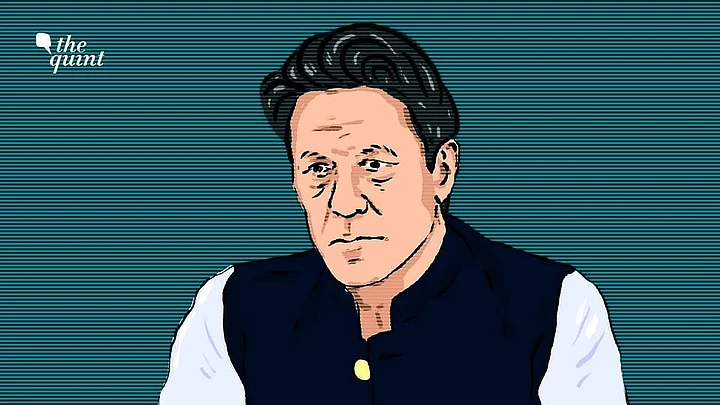The blows keep coming for Imran Khan, even months after his ouster from Pakistan's highest office.
The embattled former prime minister was on Tuesday, 11 October, slapped with a case of financial irregularities by the Federal Investigation Agency for allegedly receiving prohibited foreign funding.
The First Information Report (FIR) against the 69-year-old politician states that one Arif Masood Naqvi, the owner of Wooton Cricket Limited, transferred "ill-gotten" money to one of the bank accounts of Khan's Pakistan Tehreek-e-Insaf (PTI), as per the Dawn newspaper.
The complaint alleged that Khan and the PTI violated the Foreign Exchange Act by being beneficiaries of suspicious financial transfers.
The FIR also said that attempts were made to "disguise the true nature, origin, location, movement and ownership of these funds."
This case is the latest in a string of legal blows for the former PM, who has been at the receiving end of the ire of the Shehbaz Sharif administration for several months.
Here are some of the other major cases Khan is currently embroiled in.
Terrorism Charges, Arrest Warrant for Threatening Female Judge, Police
In October this year, a Pakistan magistrate court had issued an arrest warrant against Khan for allegedly threatening a female additional district and sessions judge named Zeba Chaudhry.
During a rally, he had threatened to lodge cases against his political opponents and the top brass of the police and the election commission over the treatment meted out to his aide, Shahbaz Gill, who was nabbed on the charge of sedition.
In this regard, he had also targeted Judge Chaudhry, who had given the go-ahead for Gill's two-day physical remand.
Khan had said that Chaudhry should "prepare herself as action would be taken against her," news agency PTI reported.
Hours after his speech, Khan was booked under the Anti-Terrorism Act. However, the terrorism charges against him were dropped after the intervention of the Islamabad High Court and the case was transferred from an anti-terrorism court to a normal sessions court.
Khan had also personally apologised to Chaudhry after appearing before her bench at the sessions court.
In August, the former cricket star was also slapped with charges of violating section 144 by organising a rally in Islamabad, once again to portray his solidarity with Gill, who also served as his chief of staff.
'Leaked' Audio Tapes Case
On 2 October, the Pakistan Cabinet decided to file a case against Khan over leaked audio files, in which the former PM can purportedly be heard having a discussion with his party leaders on how to fabricate his ouster from office as a US-led conspiracy.
The tapes are said to be from the time when he was still the prime minister and was facing a no-confidence motion in the National Assembly.
At least two audio tapes have been circulating on social media, in which Khan is allegedly heard giving directions to his party leaders and workers on how to pin the blame on the US and achieve political ends.
Khan has repeatedly blamed his ouster, following a trust vote in April, on a "foreign conspiracy" against him by the US, a charge the country has repeatedly denied. He had also claimed that he had a diplomatic cable to prove his allegations.
Hooliganism, Sloganeering Charges
In August, the Pakistani Police had booked Khan in connection with a sloganeering incident against Prime Minister Shehbaz Sharif at Saudi Arabia's Masjid-e-Nabawi.
The FIR stated that 150 supporters of Khan had been sent from Pakistan to Saudi Arabia to heckle Sharif and his delegation, on the direction of the PTI's top brass. Another group was sent from London as well.
A purported video of the incident showed some people screaming "chor" (thief) and "gaddar" (traitor) after seeing the delegation make its way into the mosque.
Several former ministers and allies of Khan were also booked in connection with the case, including Fawad Chaudhry and Sheikh Rasheed, and ex-deputy speaker of the national assembly Qasim Suri.
The Saudi Arabia Police had convicted six Pakistanis on the charge of "abusing and insulting" Sharif and his delegation, and sentenced half of them to eight years in prison and the other half to 10 years.
Khan, however, distanced himself from the incident, saying in an interview that he could "not even imagine asking anyone to carry out sloganeering at the sacred place."
'Azadi March' Riots
In May this year, the Pakistan Police had booked Khan and several others over the riots that took place during the former's 'Azadi March', which was undertaken to protest against the Sharif administration.
Two separate FIRs were filed in the case, which mentioned the burning of metro bus stations, damaging government vehicles and protesters breaking the glass windows of the offices of news organisations Geo News and Daily Jang.
Initially, the Supreme Court had permitted the rally to be held within a specific stretch of land in the capital.
However, as violence ensued, the protesters moved beyond the designated area, and towards D-Chowk. Following this, the army was brought in to control the situation and protect the government's offices located in the Red Zone.
(With inputs from Dawn and PTI.)
(At The Quint, we question everything. Play an active role in shaping our journalism by becoming a member today.)
